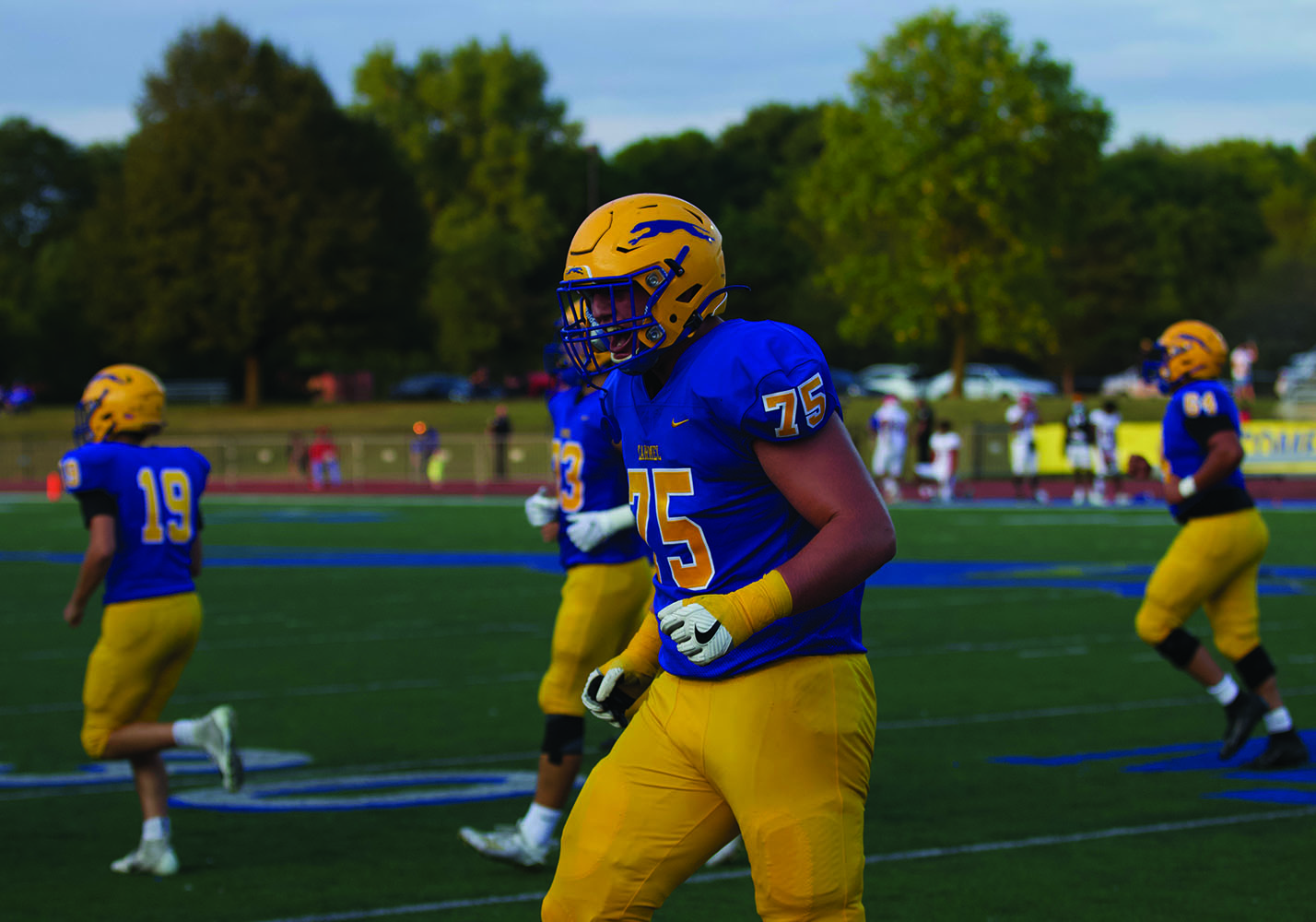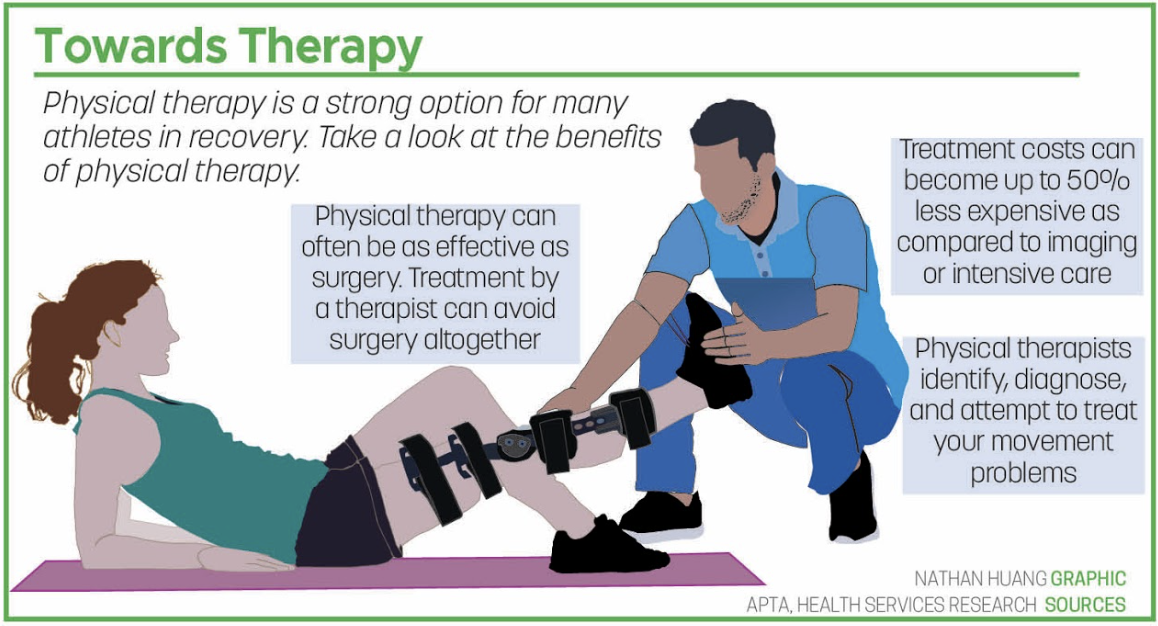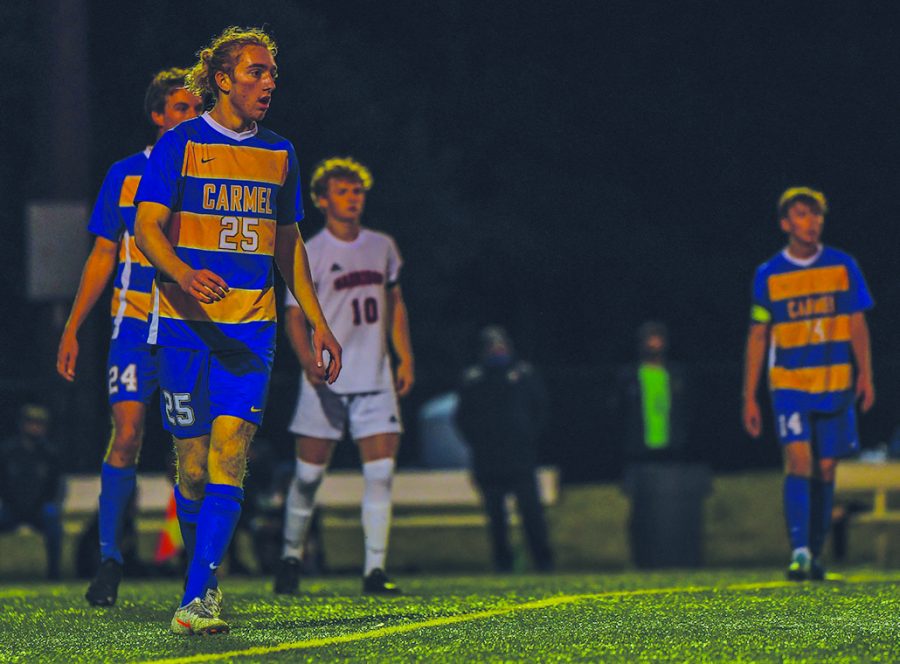For athletes like Justin Pickett, varsity football player and senior, injuries are pretty common in sports. Throughout his athletic career, which included both football and basketball, he broke his ankle, foot and leg. Those injuries required him to go through physical therapy. Pickett said that rehabilitation can be challenging for athletes, but it can also strengthen them mentally and physically in the long run.
October is national physical therapy month, and even though physical therapy focuses mainly on the “physical” part, as Pickett said, it can affect athletes in other ways.
“It’s taught me a lot through mental and physical health and how to take care of my body and prevent things like that,” Pickett said via email.
Pickett said one of the biggest challenges of not being able to play due to an injury was watching the team play without him.
He said, “Physical therapy is definitely a frustrating (thing) because you have to sit there and do things that seem so simple but are so difficult at the time.”
Kylee Ort, an athletic trainer with Ascension St. Vincent who works with this school’s athletes said she attributed her love for sports as the reason behind why she chose to become a physical therapist in addition to the career allowing for her to work with athletes.
“(Athletes) are always motivated to get better and feel better,” Ort said via email.
Ort also explained some of the challenges that come with being an athletic trainer. For example, she also discussed how physical therapy can be more than just the “physical” aspect, since the mental part can play a huge role in these athletes and their performance on the field, especially after an injury.
“At times, the mental health approach to athletes is the biggest part of our job, Ort said. We can be an athlete’s favorite person and least favorite person all in the same day. Sometimes we are the bad guy for taking them out of a game or out of practice and that’s when we have to paint them the bigger picture.”
She also said there is always the option of seeing a sports psychologist for athletes in more difficult situations regarding physical therapy.
“When athletes are mad or frustrated with coaches, we are there to support them and let them get their frustrations out in a safe space. We are very lucky when it comes to mental health and working for St. Vincent because when an issue goes above our qualifications we can forward them on to our Sports psychologist to get the necessary care they need,” Ort.
Similar to Pickett, Baenan McKeown, junior and varsity soccer player, also suffered an injury which caused him to go through physical therapy. Mckeown pulled his hamstring, suffering a Grade 1 pull. He said that he went through a return to play progression during physical therapy, which assessed his strength level in order to allow him to return to participating again safely. He also said that the doctors gave him exercises to help strengthen his muscles and to help prevent more injuries from occurring in the future. Like Pickett, Mckeown said the injury affected his thoughts on soccer and what he thought he could improve on to help make him a better athlete.

Senior Justin Pickett walks off the field after a road football game against Pike High School. Pickett said he has had quite a few injuries in the past but has used physical therapy as a way to strengthen his injured parts as well as his mind. Physical therapy has been used by many athletes around the world and is starting to become popular among high school athletes. (HTCI)
“If my hamstrings weren’t strong enough then I would tell myself, okay, I have to get into the gym and work on my hamstring strength, so this doesn’t happen again. (It) kind of just motivated me to like change my training to make sure it doesn’t happen again,” McKeown said.
He also said ultimately, going through this injury along with physical therapy made him a better athlete and improved his performance on the field.
“I’d say (it made me a better athlete) because you obviously need it if you want to return to play A) healthy and B) sooner than if you hadn’t done physical therapy. So in that sense I definitely think it’s made me a lot better athlete because it’s allowed me to actually return to play 100%.,” McKeown said.
Even though physical therapy can be highly detailed and time-consuming, it has many benefits for athletes both mentally and physically.
Pickett said, “It shows my weaknesses and helps me better prepare for the game I play and for my future. It also has taught me so much about mental health and how to overcome adversity.”






























![Keep the New Gloves: Fighter Safety Is Non-Negotiable [opinion]](https://hilite.org/wp-content/uploads/2024/12/ufcglovescolumncover-1200x471.png)
















































![Review: “We Live in Time” leaves you wanting more [MUSE]](https://hilite.org/wp-content/uploads/2024/12/IMG_6358.jpg)
![Review: The premise of "Culinary Class Wars" is refreshingly unique and deserving of more attention [MUSE]](https://hilite.org/wp-content/uploads/2024/12/MUSE-class-wars-cover-2.png)
![Introducing: "The Muses Who Stole Christmas," a collection of reviews for you to follow through winter [MUSE]](https://hilite.org/wp-content/uploads/2024/12/winter-muse-4.gif)
![Review: "Meet Me Next Christmas" is a cheesy and predictable watch, but it was worth every minute [MUSE]](https://hilite.org/wp-content/uploads/2024/11/AAAAQVfRG2gwEuLhXTGm3856HuX2MTNs31Ok7fGgIVCoZbyeugVs1F4DZs-DgP0XadTDrnXHlbQo4DerjRXand9H1JKPM06cENmLl2RsINud2DMqIHzpXFS2n4zOkL3dr5m5i0nIVb3Cu3ataT_W2zGeDAJNd_E-1200x884.jpg)
![Review: "Gilmore Girls", the perfect fall show [MUSE]](https://hilite.org/wp-content/uploads/2024/11/gilmore-girls.png)
![Review in Print: Maripaz Villar brings a delightfully unique style to the world of WEBTOON [MUSE]](https://hilite.org/wp-content/uploads/2023/12/maripazcover-1200x960.jpg)
![Review: “The Sword of Kaigen” is a masterpiece [MUSE]](https://hilite.org/wp-content/uploads/2023/11/Screenshot-2023-11-26-201051.png)
![Review: Gateron Oil Kings, great linear switches, okay price [MUSE]](https://hilite.org/wp-content/uploads/2023/11/Screenshot-2023-11-26-200553.png)
![Review: “A Haunting in Venice” is a significant improvement from other Agatha Christie adaptations [MUSE]](https://hilite.org/wp-content/uploads/2023/11/e7ee2938a6d422669771bce6d8088521.jpg)
![Review: A Thanksgiving story from elementary school, still just as interesting [MUSE]](https://hilite.org/wp-content/uploads/2023/11/Screenshot-2023-11-26-195514-987x1200.png)
![Review: "When I Fly Towards You", cute, uplifting youth drama [MUSE]](https://hilite.org/wp-content/uploads/2023/09/When-I-Fly-Towards-You-Chinese-drama.png)
![Postcards from Muse: Hawaii Travel Diary [MUSE]](https://hilite.org/wp-content/uploads/2023/09/My-project-1-1200x1200.jpg)
![Review: "Ladybug & Cat Noir: The Movie," departure from original show [MUSE]](https://hilite.org/wp-content/uploads/2023/09/Ladybug__Cat_Noir_-_The_Movie_poster.jpg)
![Review in Print: "Hidden Love" is the cute, uplifting drama everyone needs [MUSE]](https://hilite.org/wp-content/uploads/2023/09/hiddenlovecover-e1693597208225-1030x1200.png)
![Review in Print: "Heartstopper" is the heartwarming queer romance we all need [MUSE]](https://hilite.org/wp-content/uploads/2023/08/museheartstoppercover-1200x654.png)




